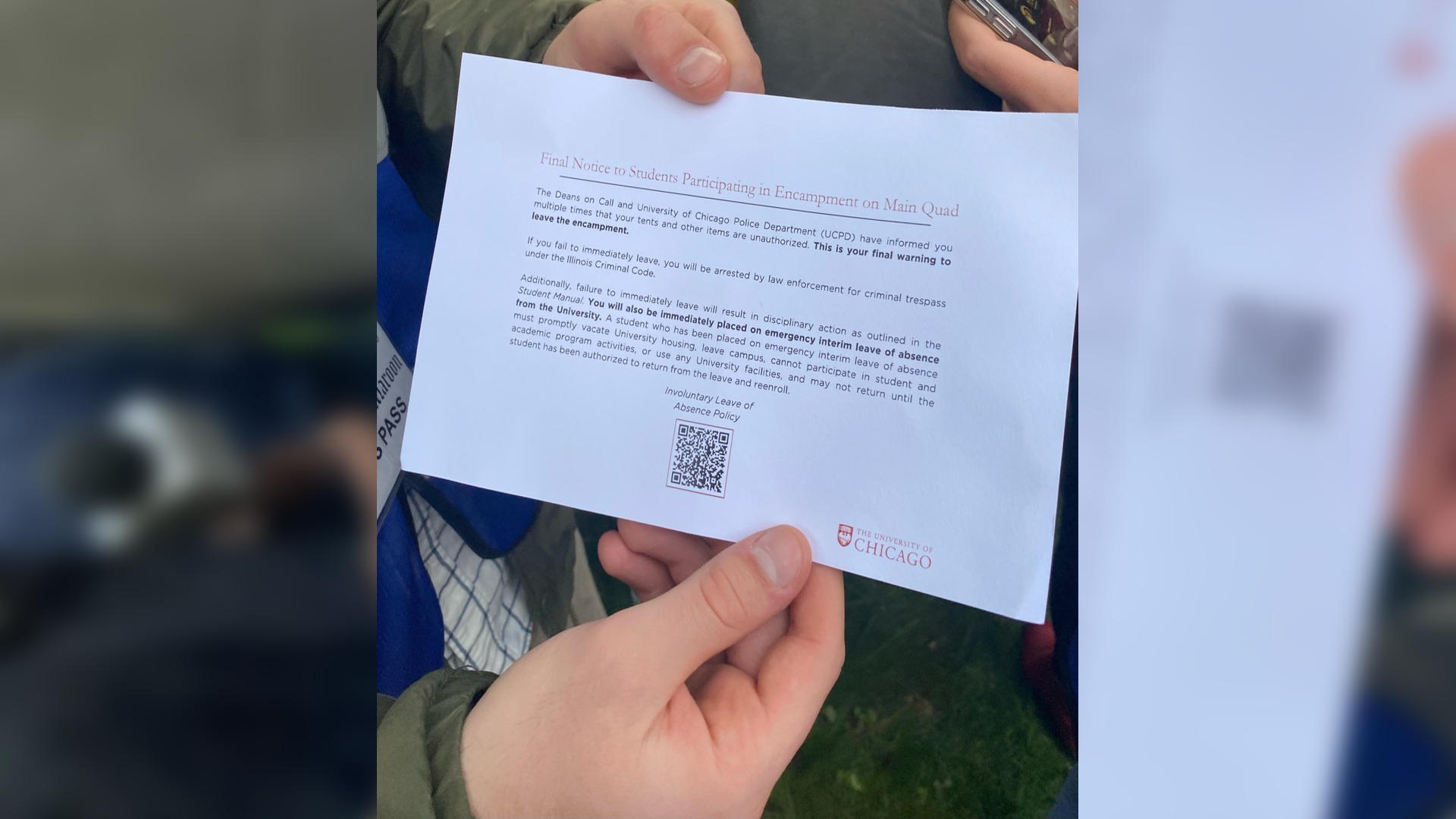U of Chicago dismantle Pro-Palestinian encampment; protesters vow to remain

The University of Chicago campus police department early Tuesday began ordering students to leave an encampment that had been the site of Pro-Palestinian protests since last week.
NBC 5’s Patrick Fazio reported that bulldozers and trucks arrived at campus around 4:45 a.m. By 5 a.m., campus police, some dressed in riot gear, had begun to dismantle the camp, removing tents, barriers, equipment and more.
“Police ordered all student protesters to clear out or face criminal charges as well as a leave of absence from the university if they do not comply,” Fazio reported early Tuesday morning from the Hyde Park campus.
NBC 5 did not witness any arrests take place.
Overnight, protesters mobilized, with many holding a rally around 3 a.m., Fazio said, after they had received a tip that both Chicago police and campus police were set to clear out the camp.
Around 6 a.m., Fazio reported Cook County Sherriff’s Deputies were present on city streets. Some road closures near the campus were reported.
By 6:30 a.m., Fazio reported that dozens of protesters were still present and vowed not to leave, while campus police blocked entrances to the main quadrangle.
Campus police also distributed flyers that contained a “Final Notice” to protesters.
“The Deans on Call and University of Chicago Police Department have informed you multiple times that your tents and other items are unauthorized,” the notice reads in part. “This is your final warning to leave the encampment.”
The flyer notes that protesters who fail to leave will face “immediate disciplinary action” and be placed on “emergency interim leave of absence from the University.”
Later Tuesday morning, University of Chicago President Paul Alivisatos posted a statement about the action, saying that “safety concerns have mounted” over the last few days.
“The risks were increasing too rapidly for the status quo to hold,” the statement said. “This morning, the University intervened to end the encampment.”
The statement also said school officials were able to find some common ground with protesters during negotiations, but that “a number of the intractable and inflexible aspects of their demands were fundamentally incompatible with the University’s principled dedication to institutional neutrality.”
The full statement can be found here.
The Tuesday response from university police comes a day after officials at the University of Chicago said talks between protesters and the school were “suspended.” In a Monday statement, the University called the protesters’ requests “inconsistent with the University’s principles.”
“University leadership including academic deans worked with student designees of the protesters and faculty to explore possible paths to an agreement within the University’s principles,” the statement issued Sunday said in part. “All agreed to respect the confidentiality of those discussions.”
The university also said there were “inaccuracies and mischaracterizations” on social media regarding the school’s current policies.
“In particular, the Scholars at Risk program is an existing initiative at the University of Chicago and other leading universities and colleges. The program is open to scholars throughout the world,” the statement continued. “All scholars impacted by this conflict are being encouraged to participate.”
The statement went on to say that the school has not agreed to “reduce” campus security or police presence based on negotiations.
Other college campuses in Chicago have seen similar protests, including at the School of the Art Institute of Chicago, where dozens of protesters over the weekend were arrested for criminal trespass to property after failing to disperse from downtown campus despite receiving several verbal warnings.
Friday, police Chicago police were called to encampments at DePaul University, standing between Pro-Israel and Pro-Palestine groups for hours. At that encampment, signs and chants containing antisemitic rhetoric were reported.
“We’re here to support Jewish students, we’re here to make sure they are safe and cared for,” one speaker during the dueling protest said.
In a speech at a Holocaust Remembrance Day event over the weekend, Yinam Cohen, Consul General of Israel to the Midwest called on local leadership to address the reports of rising antisemitism as protests continue.
“Chicago, we have a problem,” Cohen said. “And we can’t turn a blind eye to it. Combating antisemitism is not the job of Israel or the local Jewish community. It is the responsibility of local leadership. We have the legal, educational, and political tools to combat this hate.”
This story uses functionality that may not work in our app. Click here to open the story in your web browser.
Welcome to Billionaire Club Co LLC, your gateway to a brand-new social media experience! Sign up today and dive into over 10,000 fresh daily articles and videos curated just for your enjoyment. Enjoy the ad free experience, unlimited content interactions, and get that coveted blue check verification—all for just $1 a month!
Account Frozen
Your account is frozen. You can still view content but cannot interact with it.
Please go to your settings to update your account status.
Open Profile Settings